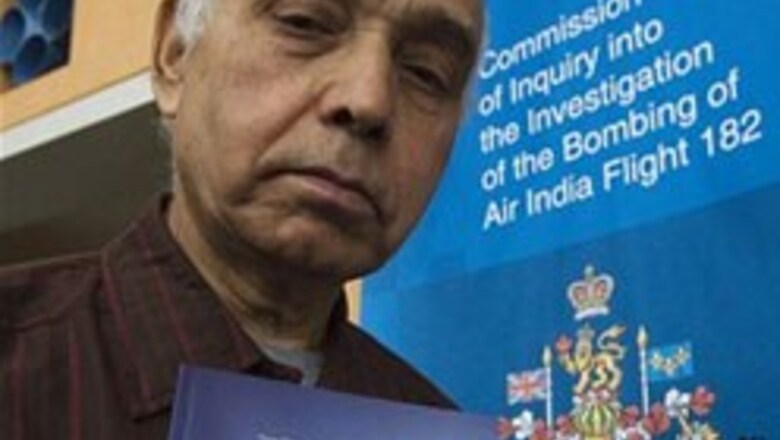
views
Toronto: The interim report of the public inquiry into the 1985 Air India terror bombing has for the first time put on record the trauma of the victims' families, castigating the government for ‘short-changing’ them on compensation and finding fault with the official response to the tragedy.
The Air India Kanishka Flight 182 from Toronto to New Delhi was brought down by a bomb, allegedly planted in its luggage hold by militants in Vancouver, off the Irish coast on June 23, 1985 killing all 329 people on board.
Plot mastermind Talwinder Singh Parmar, who fled to India, was killed in a shoot out with police in 1992. The criminal trial of two suspects - Ripudaman Singh Malik and Ajaib Singh Bagri - ended in their acquittal in March 2005 for lack of evidence.
The acquittals led to demands by the victims' families and Indo-Canadian politicians for a public inquiry to fix responsibility for the horrific tragedy. The then Liberal Party government rejected the demand. But the Conservative Party, after taking over in January 2006, ordered an inquiry by former Supreme Court chief justice John Major in May 2006.
The public inquiry opened last year with three-week-long testimonies of the victims' families.
Tuesday's 211-page interim report mainly narrated these testimonies - the nightmares of families after losing dear ones, how they were benumbed by the shock, how they coped with it, how they had to pay for grief counseling, and how some turned this tragedy into a life-long mission to serve others.
Highlighting the inadequate response to the tragedy, the testimonies pointed out how the government had deputed only three extra staff at the Foreign Affairs Department to tackle the crisis and assigned only seven diplomats and three support staff at the crash site in Ireland to help them identify and fly home the bodies.
The interim report said the diplomats assigned to help had little training for the task.
"They were well-meaning and well-intended, but unprepared and ill-equipped for what was expected of them. Their numbers and resources were inadequate for what was needed to respond to a terrorist attack," it added.
About the $20-million out of court settlement reached in 1990, the report said: "Compensation was paid only after prolonged civil litigation. It varied in amount for reasons not disclosed to the commission."
Three individuals came in for praise for turning the tragedy into a life-long noble mission.
Referring to Chandra Sankurathri, who quit his Ottawa job and went to India to set up an eye hospital and a school after losing his wife and children, the report said he showed "how a man dealt with grief by rebuilding his life to help so many people overcome illiteracy and eye disease".
About Toronto-based Bal Gupta, who after losing his wife formed the Air India Victims' Association, it said: "He remained patient against all odds as he fought to keep the memories alive and to press authorities at various levels for a criminal investigation and a public inquiry."
For Lata Pada, a Mississauga-based classical dancer who lost her husband and two daughters, it said: "Despite many setbacks and disappointments, Lata Pada continues to advocate on behalf of the families of the victims."
Reacting to the interim report, former Canadian health minister Ujjal Dosanjh told IANS: "Today (Tuesday), Canada has officially owned the Air India tragedy as its own. Making the testimonies of the victims' families a part of official records fills a gap.
"Till now, the victims felt that the Canadian institutions treated them as second-class citizens. Today, they will feel good knowing that they are as much Canadian as anyone else. Though delayed, it is a very good step."


















Comments
0 comment